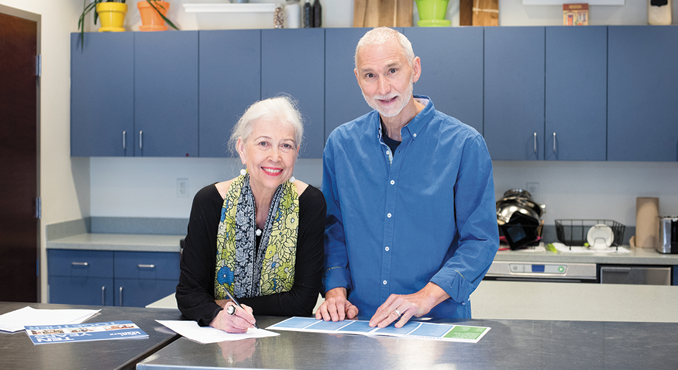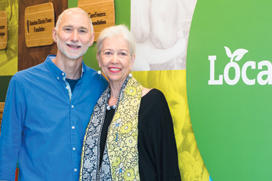Local Heroes: Michael Jones & Noreen Warnock of Local Matters
Q: Why is food education so crucial?
Michael: I was getting ready to become a new dad and I read an article that basically said my daughter’s generation was going to be the first generation ever whose life expectancy would be shorter than mine. That really hit me on a very deep level. I have a public heath background and realized there’s never been a generation yet that hasn’t lived longer than the former generation. So, when I began to look around at what the issue was behind this all roads pointed towards food, and frankly, in the bigger picture, they pointed to our food system as a whole. So, Noreen and I decided early on to start working with children as young as possible to provide what we call healthful food education. In our research, we found that very few of the food education programs that we found were very detailed. So, our goal was to provide a food education experience for young children that was, as we like to describe it, long and deep.
Noreen: For me, it was crucial everyone on the economic spectrum, especially low-income children and their families, have access to healthy food, the resources to purchase it and have the ability to know what to do with it. I come from a low-income family, so I know what it was like to worry about having healthy food. The ability [for] everyone [to] have access to healthy food was what drove me. I also felt it was crucial to the health of children and our future as a society because of the cost—I think that the cost to the U.S. economy is around a trillion dollars a year—that we tackle preventing diet-related illnesses.
Q: What is the greatest challenge that Local Matters faces?
Noreen: One of the things that concerns us, and Local Matters is starting to work on this with others, is the fact there’s no health education standards in the state of Ohio; we’re the only state in the country that doesn’t have health education standards in grades K– 12. Without health education standards, we also don’t have nutrition education guidelines and curriculum that would be within those standards. That affects both individuals and our society. It’s a challenge that we want to address because, while Local Matters reached 18,000 individuals this past year in an in-depth way, that number is only the tip of the iceberg. Everyone, especially every child in school, needs to have the kind of nutrition education Local Matters (and many others) provides. Of course, the other challenge is funding because, as a nonprofit, we depend on the support of the community. So far, the community has stepped up and supported us very strongly, and we’re going to keep on doing this work.
Michael: I think one of the challenges that Local Matters faces is really keeping people’s attention relative to this issue because after a while it’s easy to become a little tone-deaf to this problem. We’ve done a lot of great work, but there’s still a lot to do, and we need our community’s continued support to do that.
Q: What is your favorite part of your organization and work?
Noreen: It’s the people who are involved in our work—the people we work with at Local Matters and our partners in the community. I’ve never met a more caring group of people who are extremely intelligent and very passionate about working on this issue. It is wonderful how people relate to this issue and are doing so much to help. I have a lot of gratitude for everyone I work with.
Michael: One of them is the relationships that we built over the many years that Noreen and I have been doing this work. I think the other thing for me is being able now, 10 years later, to step back and just look at the growth of this organization. For me, Local Matters feels like having brought a child into the world—at some point the child grows up and they really don’t need you as much anymore, and yet you’re very connected to each other. For me, that’s how I feel about Local Matters right now—it’s an organization that’s, frankly, thriving on its own, and while it doesn’t need me on a daily basis, it’s just beautiful to still be a part of the organization and to be there when they do need me.
Q: What is the best way for the community to get involved and spread the word?
Noreen: One of the ways we’re finding, from talking to people and working around the community, is that people want to advocate more for healthy food access and resources to purchase that food. Advocating is something that people can definitely do, and, of course, get involved with funding and volunteering for Local Matters and other groups doing this work.
Michael: It’s encouraging people to learn more about the connections that food has to their overall health and, frankly, what some of the continuing issues are in terms of the impact that food has on our health. I think the more people are willing to go deeper themselves, the more willing they are to stay engaged in the work of an organization like Local Matters because they realize it’s relevant and it’s important.
To learn more about Local Matters, its impact in the community and the various volunteer opportunities available, visit www.local-matters.org






